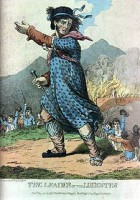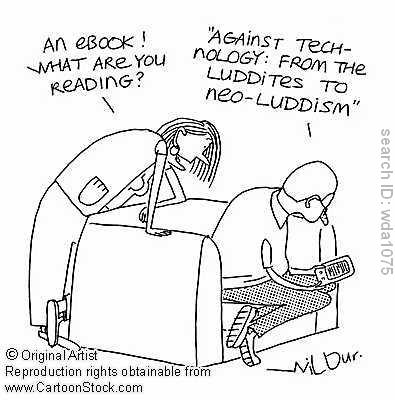Technology
Luddites were people too
The Luddites were a group of British textile workers in the 19th century who destroyed their newly automated mechanized looms. They were afraid of the advancement of technology and how it would impact their jobs.
 The Luddites derived their name from Ned Ludd. According to the mythology, in 1779, Ludd smashed two knitting frames, either because of a “fit of passion” or because he was lazy and didn’t want to work or because some kids were making fun of him.
The Luddites derived their name from Ned Ludd. According to the mythology, in 1779, Ludd smashed two knitting frames, either because of a “fit of passion” or because he was lazy and didn’t want to work or because some kids were making fun of him.
From then on, if a loom was destroyed and/or sabotaged, the workers would blame “Ned Ludd.”
By the time the Luddites formed in 1811, Ned Ludd was a mythological figure.
Ned Ludd may or may not have ever existed.
Ned Ludd may have been a lazy dude who didn’t want to fucking weave anymore, so he smashed his loom. And the Luddites named themselves after him.
Ned Ludd may have been this super sensitive sweatheart, who all the townsassholes made fun of, so one day, after a particularly horrendous bout of teasing, he let out his sadness by taking a hammer to his dad’s loom. And the Luddites named themselves after him.
Ned Ludd may have been a radical who didn’t want technology to make him obsolete, so he smashed his loom in protest. And the Luddites named themselves after him.
Or maybe Ned Ludd was dumped and in a passionately mournful moment smashed his loom to pieces. And the Luddites named themselves after him.
But the naming isn’t really even important, because it doesn’t matter what caused Ned Ludd to smash his loom. It only matters that he did, in fact, smash it. The mere action overpowered what the action actually meant. That is, it is only the signified that matters, not the signifier. And in the end, the Luddites kept the signified (the act of smashing) and fabricated their own signifier (destroying technology), which has nothing to do with the original signifier (anything from laziness to a “crime of passion”).
The Luddites were pretty radical, in their own way.
Today, people who are scared of technology are called Luddites. Urban Dictionary defines Luddite as:
One who fears technology (or new technology, as they seem pleased with how things currently are…why can’t everything just be the same?)
What really fascinates me about this word is how de-radicalized it has become. Luddites destroyed technology. If the equivalent happened today, it’d probably be called domestic terrorism. And yet, in everyday speak, Luddites are pretty complacent. They’re people who are afraid of technology but don’t do anything about it. The “real Luddites” were afraid of technology so they literally demolished it.
I didn’t know the Luddites were real people. (I just knew the vernacular term.) I thought it was pretty cool. I learn something new every day, and sometimes, I share it with you. Thank you, HTML Giant, for listening.
[And thank you, Scott Uzelman, for teaching me this.]
Tags: Luddite


I’ve never thought of a Luddite as someone who hates technology – not even quite sure what that means – though I know that’s how most people use the word. I alway took it as a compliment.
A novel that uses the Luddite rebellion, and the tensions between owners and workers, is Shirley, by Charlotte Bronte. To me, not as well-written as Villette, but an interesting mid-19th c. take on workers taking control of the means of production (the hero is not a worker, but rather a owner who ‘has’ to buy new machines that make workers ‘redundant’ because his father had left the mill in debt).
Not sure, but I think the “action” – of destroying the looms – is the sign, that is, the signifier. The signified, the legendary Ned’s intention, became transformed for (or perhaps: ‘his’ intention was accurately read by) the workers who took it to mean, as you say, ‘radicals protesting their technologically forced obsolescence’, which is what his act signified to them.
It’s the signifier that floats free from the signified meaning for the maker of a sign (the committer of an act, say) to be construed, misconstrued, polymulticonstrued, etcconstrued by others (than the sign-maker) — for which constructors, then, that sign, which is materially perhaps the same signifier, signifies a perhaps-unintended, ‘new’ signified.
The variety of meanings of the “action” (of destroying the looms) are possible signifi<eds, right? – and the “action” – Ned’s legendary destruction – is the same signifier for each. I think.
Whoa, that was careless.
The variety of meanings of the “action” (of destroying the looms) are possible signifieds – and the “action” (Ned’s legendary destruction) is the same signifier for each. I think.
Let’s try this.
s
Lily? Notice what looms.
S< ubp=p””o>rst
What
looms on shard-lattice of
looms.
http://www.primitivism.com/technology.htm for luddites n’ stuff.
The meek shall inherit the Earth.
Neo-Luddites everywhere, beware of data vampires!
http://www.time.com/time/printout/0,8816,2058114,00.html
A person asked to meet me about their writing. I made a scheduled appointment. They texted into their phone while I talked with them. I wanted to be a Luddite at that moment.
Ok, deadgod, you’re right. I was wrong.
Last night I got drunk and broke my microwave and George Forman grill, so I guess you can say I’m on the Luddiet.
vipshopper.us
vipshopper.us
[…] A comic mocking modern-day Luddites (Source: htmlgiant). […]
download
HTMLGIANT > Blog Archive » Luddites were people too